Supply Corps
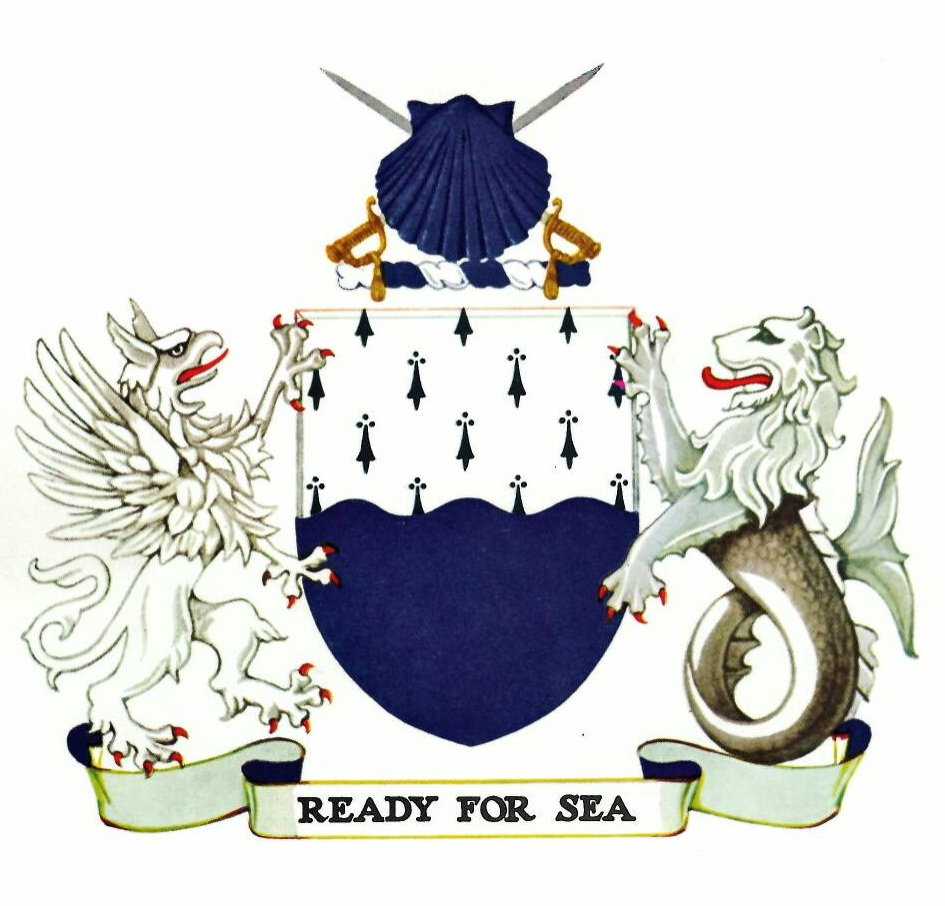
The Coat of Arms of the Navy Supply Corps. Graphic courtesy Navy Supply Corps.
The Founding of the Supply Corps – February 1795
by Lt. Frederick. P. Schmitt, SC, USN
[Reprinted from the Navy Supply Corps Newsletter, February 1970]
The origin of the Supply Corps can be traced to February 1795. It is significant in that it marks the first endeavor at military procurement.
The creation of the Office of Purveyor of Public Supplies, the first federal purchasing service, under the Secretary of the Treasury, was the realization of a five-year crusade by the treasurer, Alexander Hamilton, for treasury control over all federal procurement.
While some authors infer that Hamilton was, in effect, an “empire builder,” they generally fail to take into account the long history of financial corruption in European governments of the past. There was a sincere desire on the part of the founding fathers, especially leaders like Washington and Hamilton, to create a nation of unquestionable integrity, and they, like other federalists, felt that this could be accomplished only through strong central government.
From the founding of the Treasury Department in 1789, Hamilton felt the need for one government procurement agency, and his arguments were considerably bolstered by the complete failure of the Army procurement system in 1790, as well as the negligence that had been revealed in the administration of government contracts.
In 1790, Hamilton approached President Washington and asked him to support the transfer of responsibility for the procurement of military supplies to the Treasury. On May 8, 1792, Hamilton’s aims were partially fulfilled when the first legislation relating to government procurement was passed by the Second Congress. The statute provided:
“That all purchases and contracts for supplying the Army with provisions, clothing, supplies in the Quarter-Masters Department, military stores, Indian goods, and all other supplies or articles for use of the Department of War, be made by or under the direction of the Treasury Department.”
Although there was some rather vehement criticism from the Secretary of War, Henry Knox, the Treasury assumed the direction of military procurement on 1 September 1792.
The task of purchasing for the entire military apparently was too great for Hamilton and his small staff, for President Washington submitted the following letter to the Third Congress proposing that an office of Purveyor of Public Supplies be established under the direction of the War Department:
“Gentlemen of the Senate and of the House of Representatives:“Experience has shown that it would be useful to have an officer particularly charged, under the direction of the Department of War, with the duties of receiving, safe-keeping, and distributing the public supplies, in all cases in which the laws and the course of service do not devolve them upon other officers, and also with that of superintending in all cases, the issues in detail of supplies, with power, for that purpose, to bring to account all persons entrusted to make such issues, in relation thereto. An establishment of this nature, by securing a regular and punctual accountability for the issues of the public supplies, would be a great guard against abuse, would tend to ensure their due applications, and to give public satisfaction on that point.
“I therefore recommend to the consideration of Congress, the expediency of an establishment of this nature, under such regulations as shall appear to them advisable.
“George Washington
“United States, January 7, 1794.”
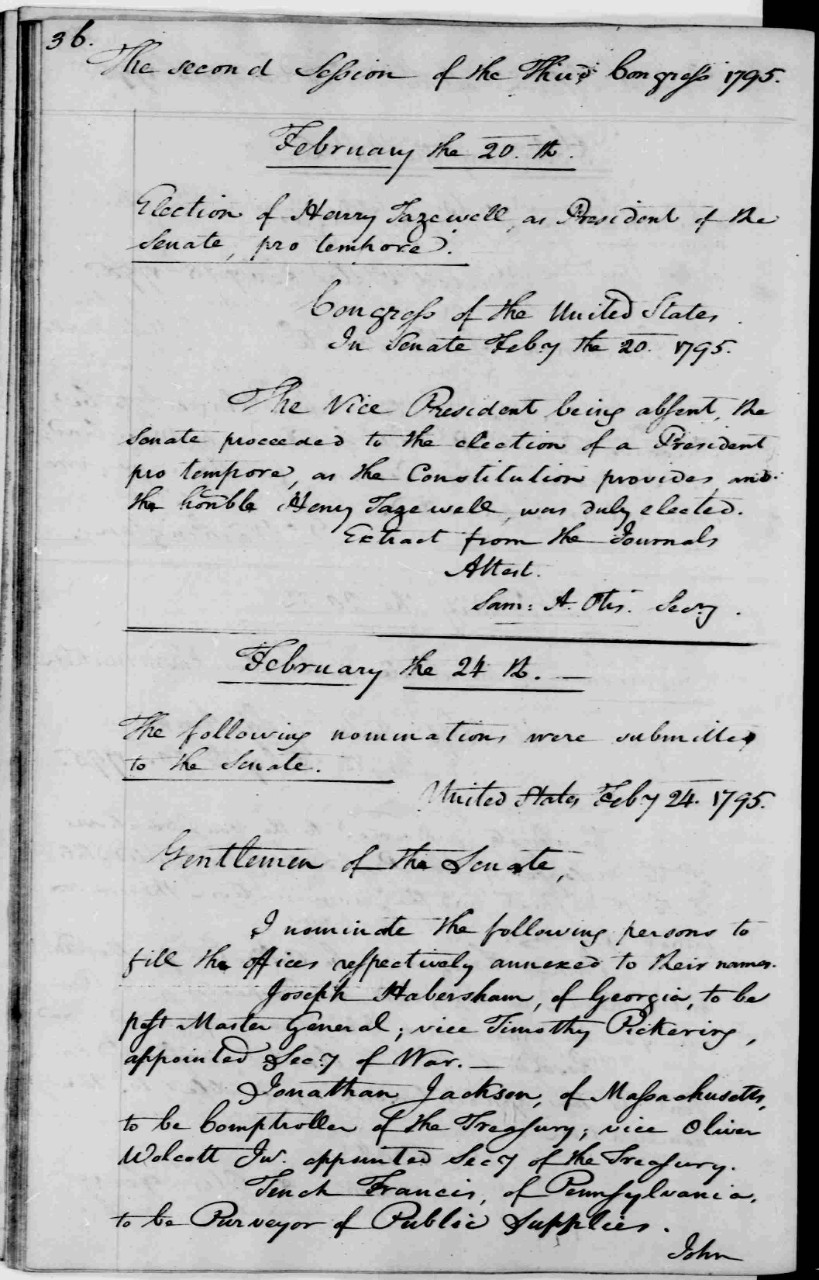
Original Tench Francis Jr. appointment letter, page 1. Photo courtesy Navy Supply Corps.
The letter was referred to a committee, whose members agreed with Washington’s conclusions and submitted a report to the House of Representatives on Feb. 19, 1794. It read (in part):
“That an officer, similar to the contemplated by the President’s message, existed during the late war.
“That the effects of order and accountability in the Department of Military stores were then of such eminent utility as induce a hope in your committee, that similar benefits will result from such an establishment as this time. It is of great importance, that the deposits of ordnance and military stores should be annually visited an inspected; and that the quality, as well as the quantity, of such stores should exactly correspond with the returns transmitted to the War Office. This object appears the more desirable, if not indispensable, in the present distributed state of public arsenals, which extend from New London in Connecticut, to Springfield in Virginia, and which are now superintended by persons of little or no accountability.
“With the duties of receiving and safekeeping the public supplies, it is also of importance that particular attention should be paid to the issues, in detail, of such supplies; and that the officer superintending the same should be vested with powers, not only that the application of such supplies is consonant to the object Government had in view, but to call to an account all persons entrusted to make such issues, and to cause a settlement to be thereof made.
“From which considerations, your committee are of opinion, that it is expedient such an establishment should be made; and thereupon submit the following resolution:
“Resolved: That a committee be appointed to bring in a bill providing for the compensation which will be required in the establishment of an office, under the Department of War, for the receiving, safekeeping, and distributing of military stores and supplies.”
Secretary Hamilton insisted that the Purveyor’s office be placed in the Treasury rather than the War Department, and it is significant that in the following letter he states that “procuring of military supplies… is… vested by law in the Department of the Treasury.”
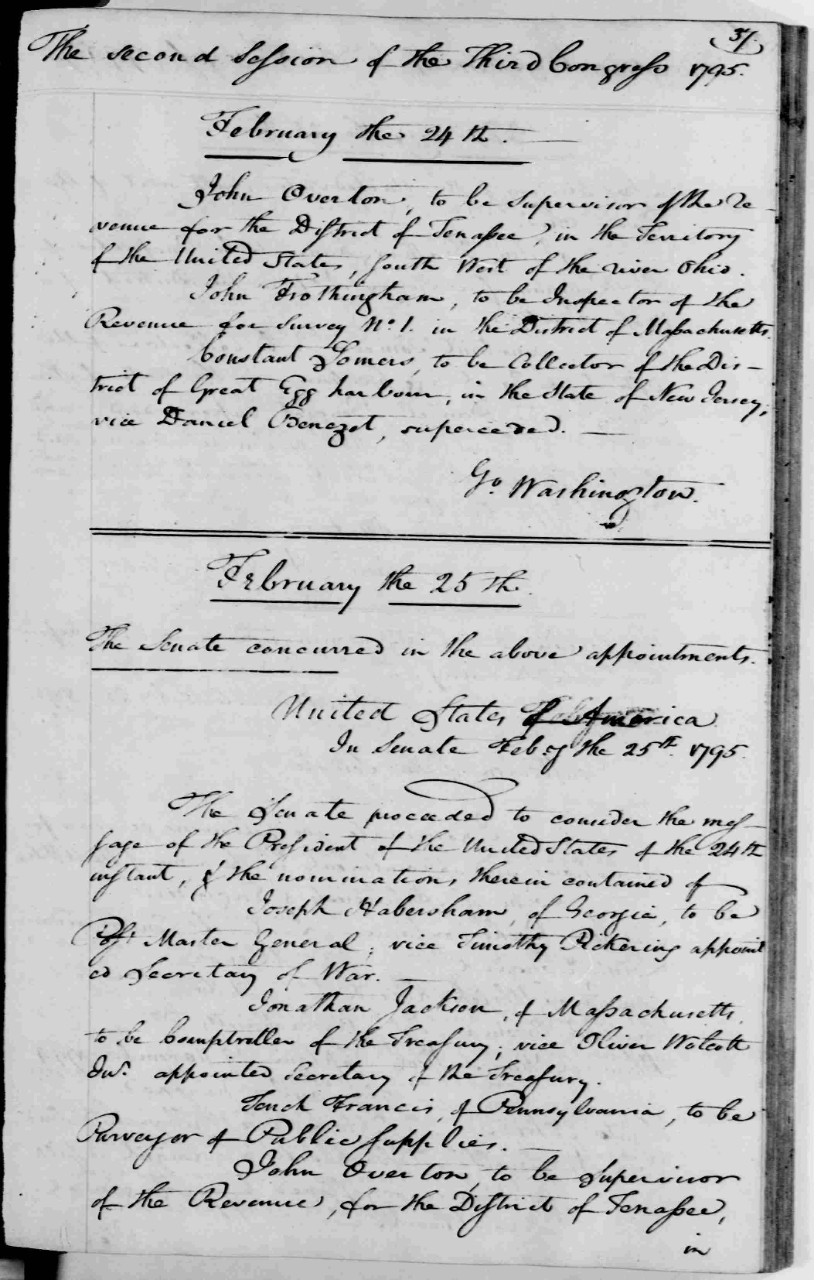
Original Tench Francis Jr. appointment letter, page 2. Photo courtesy Navy Supply Corps.
“Treasury Department, 2 December 1794
“The Secretary of the Treasury has the honor respectfully to make the following representations to the President of the Unites States, in order that be may determine on the expediency of laying the subject of it before Congress.
“The procuring of military supplies generally is, with great propriety, vested by law in the Department of the Treasury. That department, from situation, may be expected to feel a more habitual solicitude for economy than any other, and to possess more means of information respecting the best modes of obtaining supplies.
“It is, however, important that the particular arrangement should be such as to enable the Department to execute the trust in the best manner. This branch of business forms a very considerable one of the public expenditure.
“Including supplies for the Navy, it is so extensive as, to be well executed, would occupy the whole time and attention of one person, possessing the requisite qualifications. This, with the growth of the country, must be every year more and more the case. It cannot, therefore, be conducted in detail by the head of the Department, or by any existing office of it, now charged with other duties, and without being less well executed than it ought to be, or interfering with other essential duties, or without a portion of both these inconveniences, to the material detriment of the public service. Experience has already verified the position.
“It must then, of necessity, either be confided to a special agent, employed by the head of the Department, or to a new officer of the Department, to be constituted by law, and to act under the discretion and superintendence of that head. The last mode is preferable to the first, for obvious reasons.
“Whenever an object of public business is likely to be permanent, it is more fit that it should be transacted by an officer of the government, regularly constituted, than by the agent of a department specially intrusted.
“The officer can be placed by law, under more effectual checks. In the present case, that idea is particularly important. The person intrusted ought to be prohibited, under penalties, from all dealing on his own account, in the objects of supply.
“The duration and emoluments of more agency being precarious, a well-qualified man, disposed to make the necessary sacrifices of other pursuits and to devote himself exclusively to the business could with much greater difficulty, if at all, be found.
“The compensation to such an officer ought, it is conceived, to weigh nothing as an objection. Independent of the equivalent expense, arising from the necessity of employing and compensating an agent, it is morally certain that the close, constant, undivided attention of a person, charged exclusively with this object, and in condition, for that reason, to make the minute as well as extensive inquiries and investigations which are often requisite, would produce savings to the United States with which the salary of the officer could bear no comparison. It is equally evident that it would contribute greatly to punctuality, dispatch, and efficiency in procuring the supplies.
“Respectfully submitted,
“Alexander Hamilton,
“Secretary of the Treasury
Again, Hamilton made his point, for President Washington forwarded his proposal to Congress. On 23 February 1795, the law creating the office of the Purveyor of Public Supplies within the Treasury Department was enacted.
The law provided a very broad definition of the Purveyors responsibilities, stating:
“There shall be in the Department of the Treasury, an officer to be denominated, “Purveyor of Public Supplies,” whose duty it shall be, under the direction and supervision of the Secretary of the Treasury, to conduct the procuring and providing of all arms, military and naval stores, provisions, clothing, Indian goods, and generally all articles of supply, requisite for the service of the United States, and whose compensation shall be a salary of two thousand dollars per annum.”
In keeping with the concept of strict official integrity, the law prohibited any conflict of interest cautioning:
“… That the said Officer (Purveyor of Public Supplies) shall not directly or indirectly be concerned or interested in carrying on the business of trade or commerce, or be the owner in whole or in part of any sea vessel, or purchase by himself, or another in trust for him, public lands, or any other public property, or be concerned in the purchase or disposal of any public securities of any State, or of the United States, or take, or apply to his own use, any emolument or gain, for negotiating or transacting business in the said Department, other than what shall be allowed by law.”
The statute provided severe punishments for violations—a maximum fine of $3,000 and imprisonment for a term not exceeding five years, as well as disqualification from holding any subsequent government offices.
President Washington nominated Tench Francis Jr. of Philadelphia to the office and Congress soon confirmed the appointment.
Francis was born in 1730 in Fansley, Talbot County, Maryland, and with his father moved to Philadelphia in 1738. Prior to his appointment as purveyor, Francis was a successful businessman and financier. For many years, he acted as agent for the Penn family in connection with their proprietary interests. He was actively anti-Tory from the very beginning and donated £5000 to the support of the Revolutionary Army.
In 1775, Francis joined the Third Battalion of Philadelphia Associators and held the rank of captain. That same year he was appointed a colonel in the Fifth County Battalion. He remained active in several other local reserve battalions for a number of years.
After the Revolution, Francis assisted the Treasurer under the Articles of Confederation in settling financial matters, which were held over during the war.
In 1784, Francis helped plan the town of Pittsburgh with George Woods and Thomas Vickroy. He was the first cashier of the Bank of North America and held the post of treasurer of the Schuylkill and Susquehanna Canal Company and the Philadelphia and Lancaster Turnpike Company.
He died in Philadelphia on 1 May 1800.
*****
As the Navy grew from six frigates after the American Revolution, to the fleet we have today, so did its need for supplies and logisticians to manage supplies. Those who stepped up to this challenge were recognized with various titles, from pursers to pay corps officers and finally supply officers in 1913. Like today, the Supply Corps officers of the past used their innovative thinking to positive changes for Sailors, like ships stores, the common mess, the Navy’s first cookbook, central cooking and clean-up, dishwashers, dough mixers, potato mashers, regularly scheduled supply ships, and refrigeration ships—all resulting in better food, improved morale, and healthier meals.
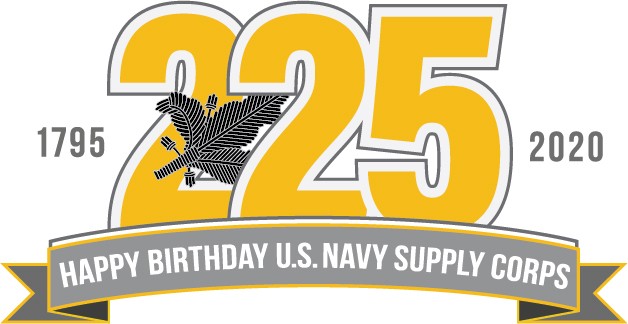
Navy Supply Corps 225th Birthday logo. Graphic courtesy of Navy Supply Corps.
The Supply Corps’ history is the story of its people—the men and women who embody resourcefulness, innovation, creativity, perseverance, integrity and dedication. Each of their stories has a place in the context of American naval history and reflects the struggle of the nation to evolve into the world’s most modern and efficient naval force.
Today, there are more than 3,300 active and Reserve component naval officers—from warrant to flag officer—who proudly wear the oak leaf identifying them as leaders in the world’s preeminent naval logistics force. Supply Corps officers serve on nearly every afloat platform, in almost every expeditionary environment, and at hundreds of shore installations worldwide. One third of Supply Corps officers serve in operational assignments, making them the most operational of all Navy staff corps.
They are trained and employed in supply chain management, operational logistics, contract management, financial management, operations research, and business enterprise management. The broad responsibilities of the Supply Corps are closely related to those of many executive positions in private industry and embrace functional areas such as financial management, inventory management, fuels management, physical distribution, and procurement. They are steadfast in their commitment to achieve their vision to produce autonomous, resourceful military logisticians with broad skills who deliver operational logistics, supply chain management, and acquisition and business capabilities to provide mission readiness.
*****
Additional Resources
Selected Imagery
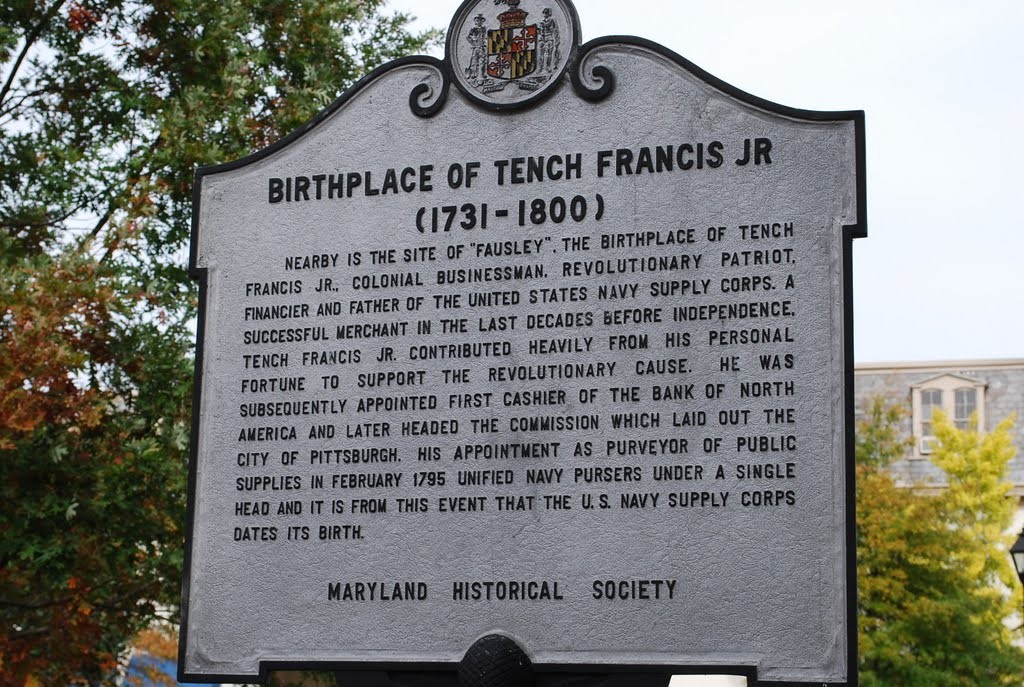
Birthplace of Tench Francis Jr. (1731–1800). Photo courtesy of Navy Supply Corps.


